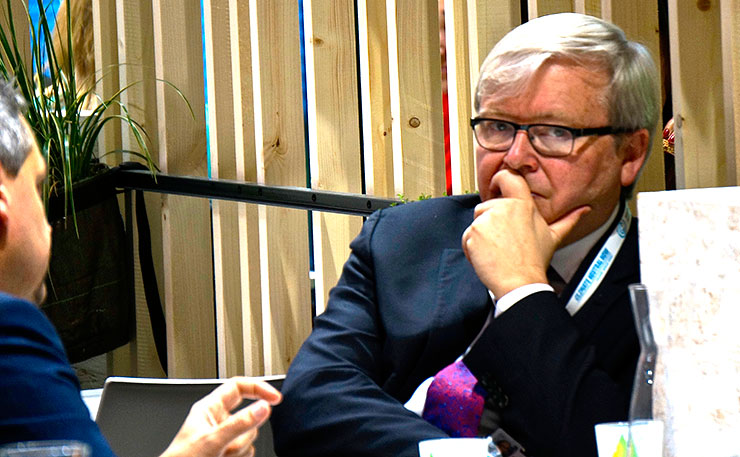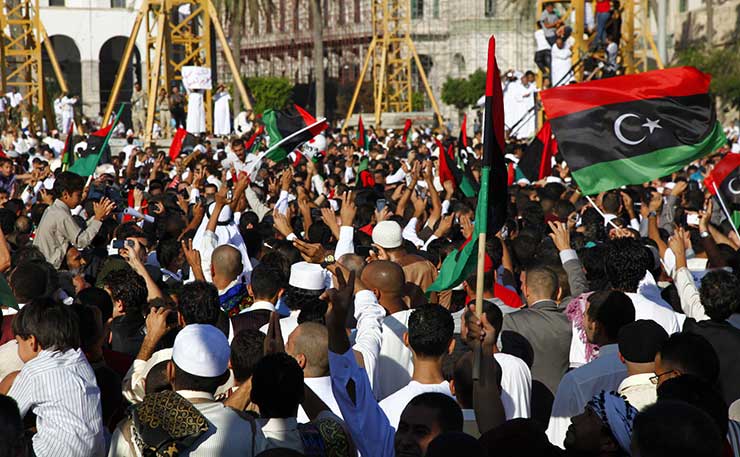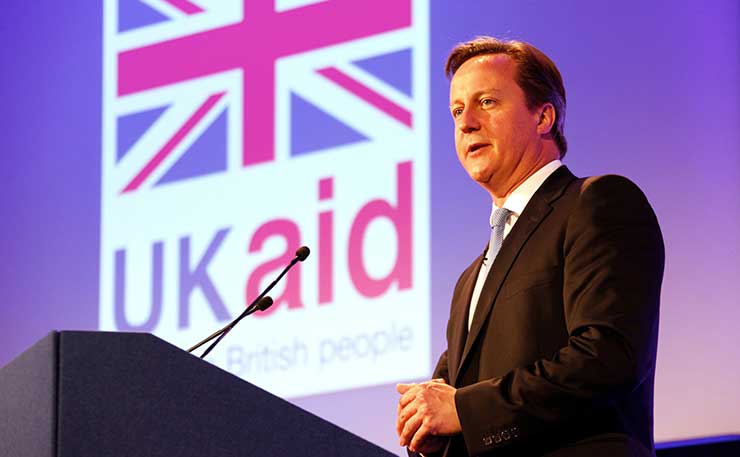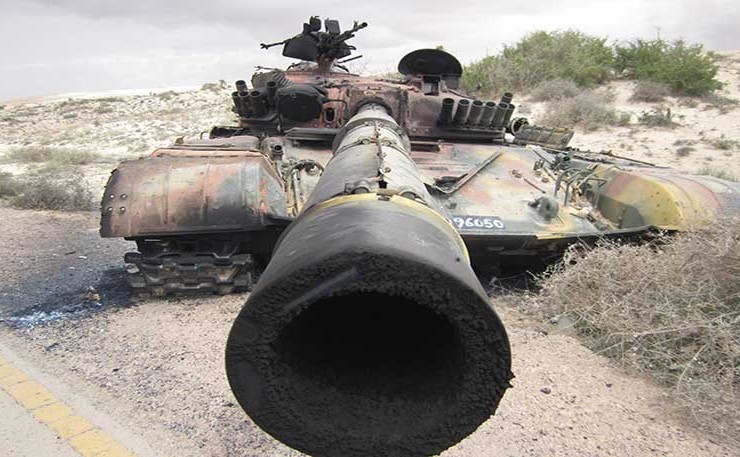The merits of Australia’s involvement in the destruction of a nation that posed no threat to us is not a debate likely to be had any time soon. Michael Brull explains why… and names and shames.
Given the recent release of an important report on the war on Libya released in the UK, it’s worth reviewing the Australian side of the war.
The primary architect of Australian involvement in the war on Libya was then Foreign Minister Kevin Rudd. He pushed for war before the UN Security Council or Prime Minister Julia Gillard had even signed on, and media reports noted the rift his war advocacy caused.
In time, Gillard came around, and also supported Australian involvement in the war.
Opposition Leader Tony Abbott was in favour of considering war when that was Gillard’s position, and quickly supported the war when it had been announced.
The Shadow Foreign Affairs Minister, Julie Bishop gave immediate support to the war on Libya, and argued from the start that the war could legitimately be expanded to topple Muammar Qaddafi.
Rudd initially hinted at an awareness that the relevant Security Council Resolution hadn’t authorised the overthrow of Qaddafi. Responding to the question of whether Qaddafi “should be targeted”, Rudd replied that “it does not provide that language”.
Within a month, Rudd proudly announced his rejection of the resolution, and international law, by announcing that Qaddafi “must go”.

In March 2012, a little under a year after the war began, Bob Carr became the new Foreign Minister. He happily claimed that his previous opposition to the war on Libya was “completely wrong”.
Rudd celebrated Qaddafi’s death, gloating over Australia’s early role in supporting war on Libya. Professor Tim Dunne regarded Qaddafi’s death as some kind of illustration of a new precedent of military interventions for humanitarian purposes.
Further to the left, Greens leader Bob Brown was an early supporter of war on Libya. When the Security Council resolution arrived authorising war, Brown immediately applauded it.
Tacitly endorsing regime change, Brown said “Colonel Qaddafi’s political demise is long overdue”. He apparently saw no problem with the way Qaddafi was killed, or Australia’s mission creep. Instead, he issued a banal press release to mark the occasion. Greens MP Adam Bandt was also a war booster, who complained that the Security Council took too long in authorising war.
Enthusiasm for the war spanned the political spectrum, including much of the Left. Mark Bahnisch criticised leftists for not supporting the war. Guy Rundle from Crikey repeatedly boosted the intervention in Libya, whilst criticising leftists opposing the war.
As late as 2014, Rundle was still willing to defend it. Dismissing the “consequences” of the war as some kind of triviality which his argument “never pivoted” on, Rundle claimed that, “Whatever the Libyans are going through at the moment, it does not compare to what would have occurred had Gaddafi restabilised his power.”
By then, there was zero ambiguity about the effect of the war. It was a complete disaster. The outstanding Middle East correspondent Patrick Cockburn reported in November 2014 that British Prime Minister David Cameron hadn’t returned to Benghazi since proclaiming victory in 2011, and wasn’t “likely to do so as warring militias reduce Libya to primal anarchy in which nobody is safe. The majority of Libyans are demonstrably worse off today than they were under Gaddafi, notwithstanding his personality cult and authoritarian rule. The slaughter is getting worse by the month and is engulfing the entire country.”
Foreign media wasn’t covering Libya anymore, as it “rightly believes it is too dangerous for journalists to go there.” Libya had fallen into an “abyss”, and the result of the intervention was a “disaster”.

Likewise, Stephen Kinzer wrote in the Boston Globe in late 2014 that, “Not even those who opposed it imagined how far-reaching its effects would be. This is likely to go down in history as the most ill-conceived intervention of the Obama era.”
He observed that, “the state has ceased to exist. There is no central government. According to Amnesty International, ‘Armed groups and militias are running amok, launching indiscriminate attacks on civilian areas and committing widespread abuses, including war crimes, with complete impunity.’”
Kinzer bitterly commented that “we allowed ourselves to believe we could crash violently into Libya, destroy all the institutions under which it had lived for more than 40 years, and blithely presume that things would somehow work themselves out peacefully and Libya would become ‘free.’”
In early 2015, the New York Times editorialised on the “unravelling” of Libya. Warning that the country was veering “toward complete chaos”, the editorialists noted the rise of ISIS in Libya, and the danger of ISIS spreading further. In August, New Yorker journalists Jon Lee Anderson wrote about the rise of ISIS in Libya. He noted that “ISIS is advancing amid a low-level civil war, pitting militias and tribes against one another in alliances that defy easy description.”
Anderson reported that, “David Cameron’s special envoy for Libya, Jonathan Powell, acknowledged that the West bore some responsibility for Libya’s collapse.”
From June, the US had started bombing Libya again, this time in pursuit of ISIS targets.
Aside from helping the rise of ISIS in Libya, our war on Libya may have contributed to the original rise of ISIS in Syria. According to Seymour Hersh, after the fall of Qaddafi, the CIA created a “rat line”, to funnel weapons from Syria into the hands of the military opposition to Assad. According to Hersh, “Many of those in Syria who ultimately received the weapons were jihadists, some of them affiliated with al-Qaida.” Part of the rat line involved “front companies… set up in Libya, some under the cover of Australian entities.”

Glenn Greenwald at the Intercept noted that as reports of Libya’s descent into collapse and civil war proliferated, those who advocated bombing the country for humanitarian reasons seemed to have disappeared. Their humanitarianism didn’t include solicitude for Libyans once the war seemed won. There were no apologies for getting it wrong.
The US eventually responded to the rise of ISIS in Libya by preparing the ground for a new war on it early this year. In August, the US Pentagon announced a new sustained offensive against Libya, this time to battle ISIS.
To his credit, Greens Senator Scott Ludlam has spoken critically about the war on Libya in the Senate. Last year, he gave it as an example of the terrible “consequences of attempting to bomb liberal democracy or otherwise implant Western priorities into the ancient rivalries and allegiances of the modern Middle East”.
Earlier this year, he criticised “those same leaders who brought regime change to Libya but did not stick around to prevent its collapse into a failed state”. He prudently didn’t name the leaders he may have had in mind.
As support for the war was so widespread among political and media elites, it makes sense that few want to dredge up the past. They can’t use the war against their political opponents, as they too are implicated in it. Thus, just like our other wars, few bother to look back.
The countries we have destroyed have hardly rated as a footnote in Australian political debate.
As for those who were displaced by the war in Libya, they have limited chance of being resettled here. Even if they did come, perhaps half of Australia would be upset, preferring they not be welcomed here.
Among the primary reasons for that opposition to Muslim migration is that they pose a threat to us, and they don’t share our values.
I suspect many from the Muslim world have a similar attitude towards us. Their fears just happens to be a lot more rational than ours.
Donate To New Matilda
New Matilda is a small, independent media outlet. We survive through reader contributions, and never losing a lawsuit. If you got something from this article, giving something back helps us to continue speaking truth to power. Every little bit counts.





